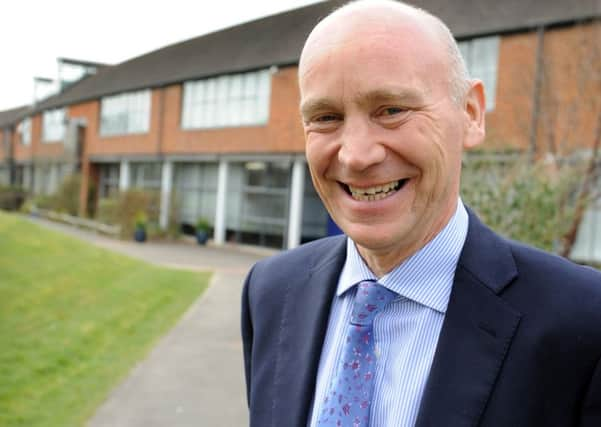Head's '˜sadness and dismay' over government grammar school plans


On Monday (September 12), education secretary Justine Greening unveiled proposals for what the government called “a 21st century school system that works for everyone”. They included the introduction of grammar schools – which have the power to pick and choose the students they admit.
Jules White, head of Tanbridge House School, was among the many teachers to oppose the plans. In a letter to Horsham MP Jeremy Quin, he spoke of his “sadness and dismay” at the government’s belief grammar schools were a step forward.
Advertisement
Hide AdAdvertisement
Hide AdExpressing his concerns the changes would see many children lose out, Mr White added: “Put simply, the plans are divisive and backward looking.
“There is no evidence to suggest that segregating youngsters at any age benefits those from disadvantaged backgrounds let alone supports the many whose academic starting points are deemed to be ‘average’ or ‘below average’.”
Speaking about the advantages already on offer to children from more well-off families – such as private tuition – Mr White added: “The advent of new grammar schools will cement these advantages a thousand times over.”
The National Association of Headteachers (NAHT) polled 2,500 of its members, with 82 per cent of those who responded opposing grammar schools.
Advertisement
Hide AdAdvertisement
Hide AdRussell Hobby, general secretary of the NAHT, said: “Increasing the number of grammar schools will lower standards and restrict opportunity.
“We cannot afford such an elitist policy in the 21st century – as many students as possible need a high-quality academic education. This is a terrible distraction from the issues that matter most.”
Among those issue are an ongoing lack of suitable funding for the country’s schools as well as a teacher recruitment shortfall school leaders have long feared has reached crisis point.
Mr White said: “To remain successful, or to improve further, schools don’t need to cream off the ‘best’ students but we do need high quality staff and adequate funding.
Advertisement
Hide AdAdvertisement
Hide Ad“The problem is though that funding is being squeezed and there aren’t enough quality teachers to go around.
“Even is leafy Horsham, Tanbridge House is struggling to recruit effectively and to make ends meet financially. What chance have those schools and academies situated where children’s needs can often be greater?
“The solution does not lie in selection for the few and second class status for the many. The solution is having enough funding and enough really good teachers available to every child in the country.”
Last week, Prime Minister Theresa May pledged to make Britain “the great meritocracy of the world” – a society governed by people selected according to merit – and Ms Greening felt education lay at the heart of that pledge.
Advertisement
Hide AdAdvertisement
Hide AdMr White had personal as well as professional reasons for opposing the introduction of selective grammar schools.
His niece, Ella, has spina bifida and, while the child “is bright and lovely and has dreams and aspirations like everyone else”, Mr White said it would be “something of a minor miracle” if she ever passed a grammar school entrance exam.
He said: “How sad then – how bloody disgraceful – that on the same day that Ella started school the government introduced policies to expand selection and segregation via grammar schools at the age of 11.
“Every child has the right to a first-class education where they can achieve their full academic potential.”
Advertisement
Hide AdAdvertisement
Hide AdHe acknowledged that meritocracy was “no bad thing” and that life created some inequalities and unfairness, but added: “Social and educational policy should not, however, be complicit in creating injustice for the masses.”
His views were shared by Malcolm Trobe, interim general secretary of the Association of School and College Leaders. Mr Trobe said: “We don’t need more selection in the education system. What schools desperately need is enough teachers and enough funding, both of which are in critically short supply.
“The government should focus on these issues rather than obsessing about an education policy plucked from the 1950s.
“Our job is to work together to ensure the education system supports all young people to achieve.”
Advertisement
Hide AdAdvertisement
Hide AdMr White added: “For every family that feels it can benefit from selection at 11 years of age, there will be 10 that do not.
“It is time for educational and political leaders to speak out against a set of ideas that takes us back to the dark ages.”
The consultation into Ms Greening’s proposals ends on December 12.
To take part, log on to consult.education.gov.uk and search for ‘Schools that work for everyone’.
Searching for the right school in Sussex for your child? - Visit educationsussex.com for authoritative reviews and so much more.